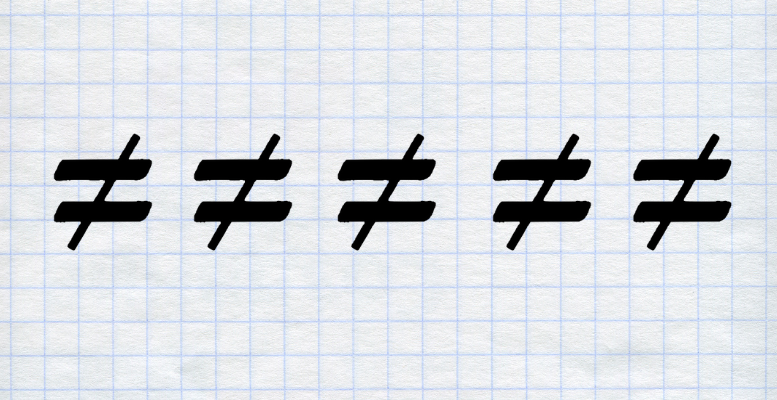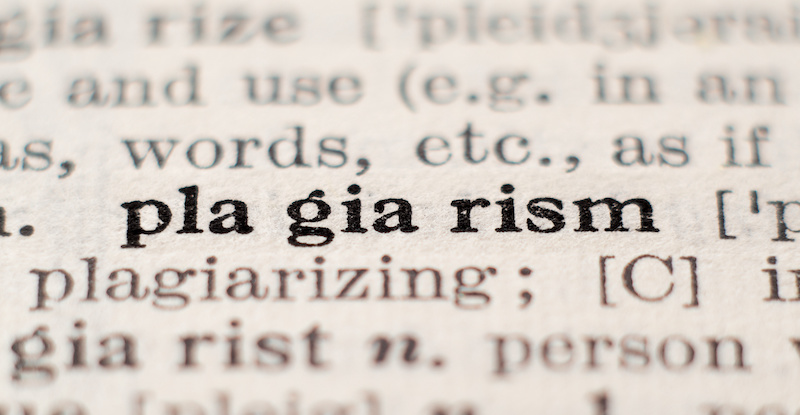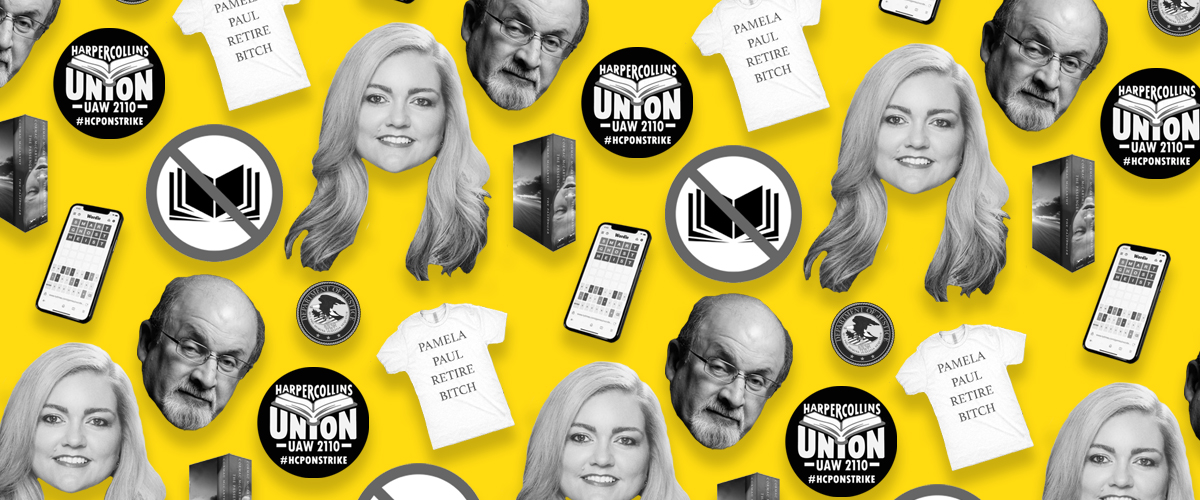It was the best of times, it was the worst of times… All right, it was mostly still the worst of times. Looks like we’re stuck in the dark timeline, guys. Sorry about that. Still, things happened this year, and some of them happened to books, or book people, or book Twitter (RIP?).
For the sake of posterity, and probably because we’re masochists, this week we’ve been counting down the 50 biggest literary stories of the year, so you can remember the good, the bad, and all the literary non-hotties we met along the way. But you’ve made it to the end, almost. So with no further ado, these are the biggest literary stories of 2022:

10.
After sixteen years, Cormac McCarthy returned . . .
. . . with not one, but two new novels. On the late date of March 8th, Knopf announced that it would be publishing two linked novels by Cormac McCarthy in the fall of 2022, namely The Passenger on October 25 and Stella Maris on November 22, with a nice boxed set available on December 6. These being, of course, the first books from the celebrated novelist since his Pulitzer Prize-winning 2006 masterpiece The Road. Suffice it to say, the literary world has been interested in this news.
Together, the novels tell the story of Bobby and Alicia Western, siblings and the children of one of the inventors of the atom bomb. The Passenger focuses on Bobby, “a salvage diver, haunted by loss, afraid of the watery deep, pursued for a conspiracy beyond his understanding, and longing for a death he cannot reconcile with God.” While diving at the site of a plane crash, Bobby discovers that one of the passengers, as well as the plane’s black box and the pilot’s flightbag, are missing.
Bobby becomes entangled in the mystery, while “shadowed in body and spirit—by men with badges; by the ghost of his father; and by his sister, the love and ruin of his soul.”
The sister, Alicia, is the protagonist of Stella Maris (and McCarthy’s first female protagonist). It’s told in a series of transcripts of conversations between Alicia and the psychiatrist at a facility where she is being treated for paranoid schizophrenia.
According to New York Times reporting, McCarthy delivered a full draft of Stella Maris and a partial draft of The Passenger to his editors at Knopf—who are extremely good at keeping secrets—eight years ago. –Jessie Gaynor, Lit Hub senior editor

9.
Pamela Paul went from Book Review Editor to Opinion columnist, with expected results.
Though many suspected Pamela Paul was never particularly adventurous when it came to books, her new sinecure in the Times op-ed pages quickly revealed just how intellectually ungenerous the former editor of the NYTBR was (and is).
In a series of op-ed’s echoing the shallower orthodoxies of the American center-right opinion machine, Paul seemed to revel in provoking her former literary constituency with “just asking questions”-style polemics written in a flat register that can only be called “reactionary sample text.” From cancel culture to trans exclusion to the evils of social media, Paul managed to both anger and bore those of us who used to fixate on her every decision at the book review. But the op-ed that really pissed me off was when Paul equated government book bans with the protests of employees disgusted by their bosses’ publishing decisions. As I wrote in July:
Literary Twitter was not thrilled with Pamela Paul’s most recent New York Times op-ed, which was just another iteration of her usual formula, i.e. “the inchoate woke mob of my fever-dreams is just as bad for the world as the successful, well funded 30-year conservative plan to overrun the judicial branch of government at all levels while consolidating state and local power.” This particular exercise in false equivalencies happened to be about publishing.
Paul, of course, isn’t writing for Twitter. She’s writing for civility centrists who still think college campuses should be safe spaces for phrenologists and flat-earthers. The thought of a paragraph-by-paragraph refutation of Paul’s rhetorical bothsidesism is truly enervating, so I will merely ask her (rhetorically) how on earth she can compare government book bans to the pressures of corrective speech, both public and private, within a for-profit industry. (Particularly when Skyhorse exists and is distributed by Simon & Schuster.)
Who knows what tedious outrages 2023 will bring. –Jonny Diamond, Lit Hub editor

8.
It was the plagiarism story that wouldn’t end.
In May, writer Jumi Bello published an essay on Literary Hub about her debut novel, The Leaving, which had been scheduled to be released by Riverhead this year, but had been canceled after Bello admitted to her publisher that parts of the book had been plagiarized.
Very soon after the essay was published, it was retracted—because of another incidence of plagiarism, which other writers online had been quick to spot. The section in question was a paragraph about plagiarism, which was very similar to another paragraph about plagiarism at a website called . . . Plagiarism Today.
Much litigation and re-litigation ensued.
(For the record, I was on maternity leave during all of this.) –Emily Temple, Lit Hub managing editor

7.
Librarians found themselves under siege.
In a predictable—but nevertheless horrifying—extension of the ongoing wave of book bans across the country (not to mention the bomb threats to a children’s hospital for providing gender-affirming healthcare), public libraries across the country began receiving bomb and active shooter threats in increasing numbers this year, forcing cancellations of programming and closures.
While not all of the threats had stated motives, some were explicitly directed at LGBTQ events: “A library in a Chicago suburb canceled its drag bingo night after receiving threats earlier this month,” Motherboard reported in September. “And last week, a teen drag star was forced to cancel a book reading at a library in the Bronx after a series of homophobic threats.” Library workers who spoke to Motherboard expressed frustration with their employers’ lack of protocol around these threats, particularly given the rise in threats against public institutions in recent years.
If your side sending literal bomb threats to public libraries doesn’t make you stop and think Are we the baddies?, well… you’re exactly as evil and stupid as I assumed. And hey, a special screw you to all the angry Lit Hub commenters through the years who demanded to know what politics had to do with literature any time we published an essay about the former! The answer is this, right here.
Even the less violent attacks on librarians have been pretty disgusting. An Oklahoma lawmaker compared librarians to cockroaches while defending a “parents’ rights” bill to ensure parents could monitor what their kids are taking out of the library (despite the fact that there had been no complaints to the contrary).
In August, a middle school librarian in Denham Springs, Louisiana filed a complaint against right-wing activists who harassed and defamed her online, calling her a criminal and a pedophile, and threatening to come to her work, for stocking books with—you guessed it—LGBTQ themes.
In July, a public library in Iowa closed after incessant complaints (and actual book theft) from so-called patrons. According to reporting from Iowa Starting Line, the Vinton Public Library in Vinton, IA first became the target of conservative attacks after putting up a display of books written by Jill Biden and VP Kamala Harris. In addition to complaining that the library didn’t have a Trump book-themed display (“I can’t buy what doesn’t exist, and there weren’t quality books about Trump,” said the library’s former director Janette McMahon), people began checking out the books and not returning them. McMahon ultimately resigned because she “no longer felt comfortable living in the community.”
McMahon was replaced by Renee Greenlee, who had helped facilitate a Pride event at her previous library, and who… worked alongside LGBTQ people respectfully? Naturally, conservatives found this enraging. At a library board meeting, Greenlee was accused of promoting a “liberal agenda” because she stocked LGBTQ books and because some of the library staff were part of the LGBTQ community.
Ultimately, Greenlee, too resigned, and soon after, so did the interim director Colton Neely (an openly gay man), leaving the Vinton Public Library with no full-time staff and forcing it to close indefinitely. Further proof that these Republican shitbags hate all children, including their own. –JG

6.
Wordle took over our lives.
In October 2021, a Welsh software engineer named Josh Wardle developed a game for his puzzle-loving partner. Then he created a function that allowed uses to share little yellow, green, gray, and black squares all over Twitter and voilà, the entire internet became absolutely besotted with Wordle. According to Wikipedia, 300,000 people played Wordle on January 2, 2022, up from 90 players on November 1, 2021; a week later 2 million people played the game and in the first two weeks of 2022, 1.2 million Wordle results were shared on Twitter. We were obsessed!
The rules are simple: guess a five-letter word, and the game will tell you which letters its word doesn’t contain (gray squares), which letters are correct but in the wrong place (yellow), and which letters are spot-on (green). You have six chances. It’s an incredibly wholesome game, and a fascinating glimpse into the psychology of everyone who plays. What’s your strategy? What’s your start word, and is it the same each time? Are you one of those people who feels the need to brag about how few tries you needed, or is the quiet pleasure of besting your boyfriend during your lunch break enough? More than anything, Wordle gave us a little something to look forward to day after monotonous day. Is that not the embodiment of hope?
Every new day brings six new chances to get something right. Of course, the capitalist forces that govern our every waking moments took hold and threatened its availability: In January of this year, the game was purchased by The New York Times for an undisclosed seven-figure sum. So far, it’s still available free to play, and we hope Josh is able to buy a lot of puzzles. –Emily Firetog, Lit Hub deputy editor

5.
HarperCollins employees went on strike.
Following nearly a year of contract negotiations, a union representing 250 HarperCollins employees began an indefinite strike on November 10.
The union, Local 2110 of the United Auto Workers, includes employees from editorial, sales, publicity, legal, marketing, and design. It is advocating for a starting salary of $50,000 instead of $45,000 for its employees, who are required to live within commuting distance of New York City, where the median rent for a one-bedroom apartment is $3,750. (Union employees make an average salary of $55,000.)
Employees have not had a contract since April, and earlier this month, the publisher said it would not schedule any other bargaining sessions after rejecting the union’s latest proposal. HarperCollins also cut an estimated 12 jobs in October, including six union positions (the union filed a complaint with the National Labor Relations Board in response and after negotiations stopped).
As the strike continues, a number of HarperCollins authors have spoken out in support, union buttons have shown up onstage at the National Book Awards, and publishing workers across the field have donated to the strike fund that’s helping sustain those on the picket line. In an industry that has long offered more cultural capital than actual capital in exchange for labor—resulting in an overwhelmingly white, upper-class workforce—this has felt like somewhat of a watershed moment. It remains to be seen how their efforts will pan out; in the meantime, they have put a necessary, long-overdue, very public spotlight on this important set of industry issues. –Corinne Segal, Lit Hub senior editor

4.
Colleen Hoover’s rampant success proved that TikTok controls everything.
TikTok is more than just a fun video-sharing app for the youths. When it first launched, we millennials compared it to Vine (RIP), but how wrong we were! Because TikTok is more than just another social media outlet. It has the power to move people… to the store, to buy books, apparently.
Over the past few years, there’s been a noticeable pattern: a book goes viral on #BookTok, and the sales spike. This has been particularly true for backlist titles for young adults. Publishers have been trying to crack the algorithm. Even Barnes & Noble launched a summer reading program on the platform, called the #BookTokChallenge.
There’s no greater example of TikTok’s influence than the success story of Colleen Hoover, a YA and romance writer best known for her 2016 novel, It Ends With Us. She’s TikTok gold. Colleen Hoover (or CoHo as her fans affectionately call her) has gained so much popularity on TikTok that her latest novel was the most pre-ordered novel in Simon & Schuster’s history. Yup. It Starts with Us had sold 800,000 copies by the end of its release day. Apparently the “us” in this is TikTok. It starts with TikTok. –Katie Yee, Lit Hub associate editor

3.
The Department of Justice sued to block Penguin Random House’s acquisition of Simon & Schuster—and won.
Yup, this was big. It was revealed late 2020 that America’s biggest corporate publisher was set to acquire one of America’s other really big publishers; just about a year later, the Department of Justice announced it was suing Penguin Random House (and its parent company, Bertelsmann), much to the irritation of PRH and S&S. As Lit Hub’s Jessie Gaynor wrote at the time:
In welcome news for fans of both books and strong antitrust regulation, the US Department of Justice filed a civil lawsuit today to block Penguin Random House’s acquisition of Simon & Schuster. The complaint, filed in the U.S. District Court for the District of Columbia, details how the proposed merger would “would likely result in substantial harm to authors of anticipated top-selling books and ultimately, consumers.”
The resulting trial didn’t kick off until this past August and featured testimony from such literary luminaries as Stephen King and Andrew Solomon (on behalf of the DOJ). Witnesses for the defense included Simon & Schuster’s Jonathan Karp, along with then-PRH CEO Markus Dohle; testimony from publishing insiders was, to say the least, revealing. As Margot Atwell wrote for Lit Hub:
Throughout the trial, witnesses from the publishing industry have referred to independent presses as “farm teams…” This phrase, which resurfaced several times, deeply rankled me and others in the independent publishing community.
I don’t view book publishing as a zero-sum competitive game, but unlike the baseball system, independent presses are competing with corporate conglomerate publishers—for writers, for employees, and for readers’ attention and dollars. Minor league baseball teams compete against other minor league teams, but independent presses publish books in the same landscape as larger publishers, where Penguin Random House, Simon & Schuster, HarperCollins, and others already benefit from substantial economies of scale and bargaining power with printers, customers, and more—an advantage which this merger would increase even further.
Referring to independent book publishers as “farm teams” implies that they are small-time, amateur, and lower-quality than the massive corporate publishers that dominate the publishing landscape. It also implies that indie presses exist solely to develop raw talent to the standards of Big 4 or 5 publishers—and for their benefit.
To the surprise—and relief—of many, the DOJ actually won an antitrust case for a change. On no less an auspicious date than October 31st, US District Court Judge Florence Y. Pan blocked the merger, effectively killing the multibillion-dollar deal. It’s too soon to know what, if any, systemic effect this decision will have on corporate publishing, but the fallout has already seen Dohle resigning his position.
Who knows, maybe we ought to give worker-owned publishing a chance? –JD

2.
Salman Rushdie was attacked onstage at a literary event.
On August 12, Salman Rushdie was stabbed multiple times while on stage at the Chautauqua Institution in Chautauqua, NY, where he had been asked to deliver a lecture. The 75-year-old author was seriously injured in the attack, remaining in critical condition for days. The assailant, Hadi Matar, a 24-year-old man from Fairview, New Jersey, was taken into custody.
Rushdie has famously been the target of death threats for years, including from the government of Iran, who has been explicitly calling for his assassination since 1989, when Ayatollah Ruhollah Khomeini issued a fatwa against the author for his depictions of the Prophet Muhammad in The Satanic Verses.
In an October interview with El País, Andrew Wylie, Rushdie’s agent, spoke on the fallout from the attack: “[His wounds] were profound, but he’s [also] lost the sight of one eye… He had three serious wounds in his neck. One hand is incapacitated because the nerves in his arm were cut. And he has about 15 more wounds in his chest and torso.”
At the time, Wylie wouldn’t say whether Rushdie was still in the hospital, telling the paper, “He’s going to live…That’s the more important thing.” In response to a question about whether the stabbing was a symptom of a harsher climate with regard to free expression, Wylie called the attack “totally unexpected and illogical. It was like John Lennon’s murder.” –ET, JG

1.
Book bans spread across the country.
Book bans are unconstitutional; they are dangerous; they are a tool used by the right to uphold supremacy ideology by limiting access to information. And this year, in the US, they were more widespread than ever.
The numbers are scary. In the first eight months of this year alone, according to the American Library Association’s preliminary data, there were 681 “attempts to ban or restrict library resources,” targeting 1,651 books in total, which ALA President Lessa Kananiʻopua Pelayo-Lozada called “unprecedented.” She added that those efforts were influenced by political organizations who are circulating “lists of books they don’t like.” PEN America, which has the most extensive data on the matter, released a report in September showing that from July 2021 to June 2022, there were 2,532 “instances of individual books being banned,” with 1,648 books affected in total; a significant percentage of those books feature LGBTQ+ themes and characters of color, or they address race and racism.
Like the ALA, PEN America noted the presence of organized political groups in the fight over book bans. It recognized “at least 50” groups that have called for book bans, operating from the local to national level, some of which have dozens of chapters. “At least 20 percent of the book bans enacted in the 2021-22 school year could be directly linked to the actions of these groups, with many more likely influenced by them,” its report stated.
These fights have played out at the local level and look different in every community; in some, proposed book bans have prompted a major community showdown, while others fly under the radar, quietly limiting students’ access to literature without accountability. In Texas—where PEN America counted 801 bans during the 2021-22 school year, the most of any state—Republican state Rep. Matt Krause in the fall of 2021 created a list of 850 books and gave school superintendents a two-week deadline to confirm whether they carried them in their districts. That list, followed by Gov. Greg Abbott’s claim that schools distributing “pornographic” (read: LGBTQ+) material would face legal consequences, gave cover to other politicians or local groups to call for book bans; Texas Monthly reported that this year, districts were overwhelmed by requests to take books off their shelves.
Elsewhere, some conservative politicians attempted to use the legal system to take books out of circulation. In Virginia, state delegate Tim Anderson and failed congressional candidate Tommy Altman filed two lawsuits earlier this year that targeted two books under a state obscenity law; both cases were dismissed, with the judge noting not only that the books were not obscene, but that the obscenity law itself was unconstitutional.
Another tactic, more subtle than either intimidation or legal action, has been procedural: to set new local policies in place that make it easier to remove books from schools. In July, the Central Bucks County School District in Pennsylvania passed a policy creating a new, vague review process for library books, creating confusion in the community and alarm among residents who recognized that it could used to justify book bans. Librarians and community members, along with the state ACLU chapter, strongly opposed the new policy.
The most frequently challenged books, among other things, assert that it’s okay to be transgender or non-binary or sexual; they show queer joy or Black joy; they portray the violent consequences of racism and say, explicitly or implicitly, that those consequences are unacceptable. Kobabe’s Gender Queer, a graphic memoir about gender identity and self-discovery, is the most frequently challenged book in the US, according to PEN America; other frequently challenged titles include All Boys Aren’t Blue, George M. Johnson’s memoir of coming of age as a queer Black person, the novel Out of Darkness by Ashley Hope Pérez, and The Bluest Eye by Toni Morrison.
There has, of course, been plenty of pushback—from politicians, authors, librarians, and anyone else in the country who values free expression (which, to date, is a lot of us). The Brooklyn Public Library this April launched an initiative to make banned books available to every young person across the country, giving out more than 5,000 electronic library cards in the program’s first few months, while Chicago public officials declared in September that their city is a “book sanctuary.” Still, organizations focused on free expression continue to be troubled by the persistence of book banning. “This rapidly accelerating movement has resulted in more and more students losing access to literature that equips them to meet the challenges and complexities of democratic citizenship,” Jonathan Friedman, director of free expression and education programs at PEN America, told The Guardian. –CS


